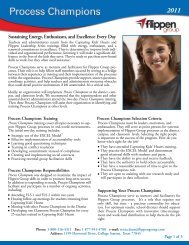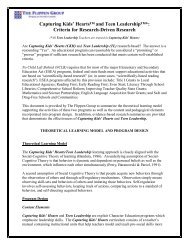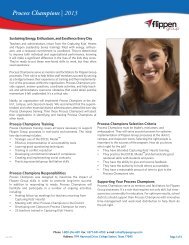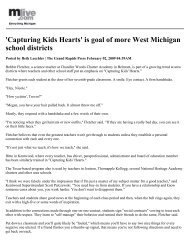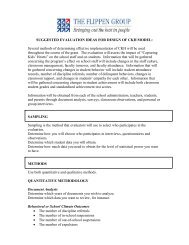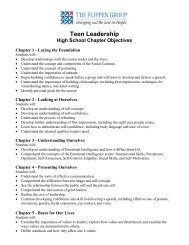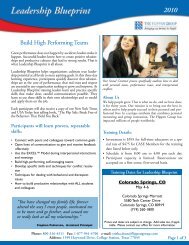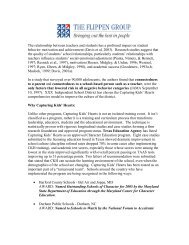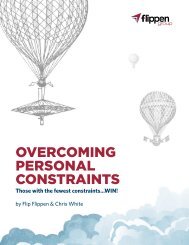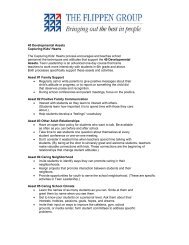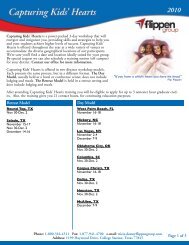Smart & Good High Schools - The Flippen Group
Smart & Good High Schools - The Flippen Group
Smart & Good High Schools - The Flippen Group
- No tags were found...
Create successful ePaper yourself
Turn your PDF publications into a flip-book with our unique Google optimized e-Paper software.
CHAPTER 4: <strong>The</strong> Professional Ethical Learning CommunityPELC Principle 6:Grapple with the tough issues—theelephants in the living room.PROMISING PRACTICES FOR GRAPPLINGWITH THE TOUGH ISSUES1. Grapple with educational policy issues impactingteaching and learning; create the conditions thatmaximize support for authentic school reform.At the outset of this chapter, we emphasized the interdependenceof excellence and ethics. We argued thatethics (e.g., the extent to which people in the school treateach other with respect and care) affects excellence (e.g.,students’ motivation to learn and staff’s willingness towork hard). We also argued that excellence (e.g., howwell teachers teach) affects ethics (the extent to whichstudents feel respected and cared about).It’s therefore crucial for the PELC to take the leadershipin ensuring that all issues affecting ethics and excellenceget addressed. In Chapter 3 we called the tough issuesaffecting excellence and ethics “the elephants in the livingroom.” (See page 57 for a survey a school can use toidentify its elephants.) Sometimes the elephant is sittingon the sofa, but everybody is ignoring it. Sometimes theelephant is under the table and hasn’t surfaced and beenidentified as the problem it really is.<strong>The</strong> PELC must ensure that all issuesaffecting excellence and ethicsget addressed.Two examples from our high school study: At one school,during an otherwise productive Monday afternoon facultymeeting, a teacher brought up an incident that had happenedafter school on the previous Friday. Someone hadbroken into several students’ lockers, taken their contents(books, papers, and the like), and strewn them over town.Another faculty member responded to this report by sayingthat school security would have to be improved.No one raised what seemed to us the inescapably importantethical questions: Why did this happen? What doesthis say about us as a community? What collective responsibilitydo we have as a school community to make restitutionto the victims of this violation? How can we preventthis from ever happening again? <strong>The</strong>re was no discussionof the possible contexts—such as advisories, classes, studentgovernment, an assembly—in which questions likethese could be addressed in the days ahead,. <strong>The</strong> meetingsimply moved on, and a crucial opportunity for thegrowth of the PELC—and the whole school community—was sadly lost.In another school we visited (not among those listed inthe report), the principal explained to a group of visitingeducators that the school’s main mission was to narrowthe achievement gap that held back the minority studentswho made up most of its enrollment. And yet, inseveral of the classes we observed, student engagementseemed lacking. Advisories seemed drawn out and notorganized to make the most productive use of time. Bathroomsweren’t clean and had several toilets that didn’twork, contributing to a climate that did not send themessage to students, “You are important to us.” Visitorscomplained to each other in hallways that they weren’tseeing the progressive practices they had been led tobelieve were being implemented at the school.<strong>The</strong> most dangerous form ofdeception is self-deception.And yet, in the faculty meeting that followed this disappointingday, the school’s leadership asked teachers to doan exercise that celebrated all the good things about theschool. Following this, another administrator invited thevisitors present to share “your observations and questionsfrom the day” but then added, “We really don’t have timeto get into criticisms, so we’d appreciate it if you wouldlimit your comments to positive things.” Here was amissed chance to get valuable feedback. All the elephantswent unaddressed—a pattern we strongly suspected hadbecome the norm in this school’s culture.<strong>The</strong> writer Josh Billings observes, “<strong>The</strong> most dangerousform of deception is self-deception.” <strong>The</strong> PELC has nogreater responsibility than to create the structures andpatterns of communication that confront, with honestyand humility, all the elephants that affect excellence andethics. Racism, sexism, hazing, cheating, bullying, verbalharassment, cliques—all these are among the difficultissues that schools often ignore at their peril. In theabsence of a professional ethical learning community thateffectively confronts such problems, many students willfail and some will drop out of school. Others may graduateand even perform well on standardized tests, but theywill never manifest the deepest indicators of humanexcellence as measured, for example, by our 8 strengths80<strong>Smart</strong> & <strong>Good</strong> <strong>High</strong> <strong>Schools</strong>



